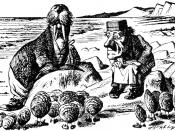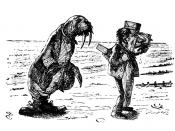Lewis Carroll's "The Walrus and the Carpenter" could possibly be just a nonsensical rhyme meant purely for entertainment value. The fact that this is a nonsense poem inside a nonsense story makes it all the more difficult to decipher a deeper meaning. Like the author, who had a darker side to him, so too might his work. Carroll made this statement in a letter to an American friend,I'm very much afraid I didn't mean anything but nonsense. Still, you know, words mean more than we mean to express when we use them; so a whole book ought to mean a great deal more than the writer means. So, whatever good meanings are in the book, I'm glad to accept as the meaning of the book. (Shaw)This passage almost defines the relationship between the author and what he or she pens. Even though it is a statement regarding "The Hunting of the Snark", he could have said it about any one of his works.
Meaning is in the mind of the reader and this is the beauty nonsensical literature. Every reader can interpret a unique hidden behind the words on the page. Many interpretations believe that the poem could be biting remarks at religion and it's followers. The main argument towards that theory is that Jesus Christ was a carpenter by trade and so the carpenter in the poem could represent Christianity. The trouble with this is that Carroll had told the illustrator that he could choose from a carpenter, a butterfly or a baronet, which is a member of the lowest titled social order the English had at the time. Carroll gave the artist these three choices only because any of them would fit the poem's meter. The illustrator wanted to sketch a carpenter and other then this there is no real reason for the career choice of the character. Could "The Walrus and The Carpenter", then be a political satire written to shed light on the atrocities occurring in the political realm at the time? Are the characters are symbolic of Capitalistic politicians and the unquestioning lackeys that follow them? This interpretation is popular and one to be examined in greater depth.
Carroll begins the poem with a sun trying with all his might to show light through the darkness. The sun symbolize Carroll himself (De Rooy). The sun shining brightly is Carroll enlightening the reader and showing light on the corruption and faults of the world. The fact that the sun is showing at night is significant of how Carroll view society. They are in darkness and his light is trying to penetrate the night. In the next stanza, the moon is upset by the sun's presence. This is her nighttime and it is very rude of the sun to be hanging around. It is no coincidence that the moon is female. Government in England at the time and to present day is headed by a woman, the Queen. She comments that it goes against his manners to ruin her good time. Surely, the Queen is benefiting from ignorance of her subjects.
The two seemingly unrelated characters that make of the title of the poem enter in line 19. The Walrus and the Carpenter symbolize the verbose, dishonest politicians that plagued British government. They walk down the shoreline and are overcome with emotion. Carroll is referencing the politicians drive for forward progress (De Rooy).
"They wept like anything to see ?Such quantities of sand:?'If this were only cleared away,' ?They said, "it WOULD be grand!'" (Carroll 21-24 qtd. in Shaw)They want to try to accomplish the impossible feat of clearing away all the sand on the beach. Politicians often do not see what they are doing when they look for advancements in the economy to be made. They even try to devise a plan in the next stanza in which seven maids with seven mops might be able to clear the sand if they swept continuously for six months. Luckily, they quickly forget about their excavation when they see something they want far more.
The rotund Walrus invites oysters from an oyster bed to come and take a pleasant walk with him and the Carpenter. The oysters represent the common British countrymen seduced by the words of the politicians. Only the aged oyster knows to be wary of walking with these shifty characters. Through his wise years and possible tricks in the past he knows enough not to budge from the mud.
"The eldest Oyster looked at him,?But never a word he said:?The eldest Oyster winked his eye,?And shook his heavy head--?Meaning to say he did not choose?To leave the oyster-bed." (Carroll 37-42 qtd. in Shaw)The youthful oysters, who have not yet dealt with such persons, agree to venture out on a jaunt. The trip down the beach symbolizes the blind way the common man will follow the politician to his eminent demise. The oysters gather and more and more follow the two leaders down the length of the beach. The Walrus and the Carpenter lead the oysters a great distance until the oysters are exhausted from the journey. Stopping on a rock that is "conveniently" low, the Walrus gathers up his followers, who stand in neat rows close by, and begins a speech with the most remembered portion of Carroll's poem.
"The time has come," the Walrus said,?"To talk of many things:?Of shoes--and ships--and sealing-wax--?Of cabbages--and kings--?And why the sea is boiling hot--?And whether pigs have wings." (Carroll 61-66 qtd. in Shaw)The Walrus's speech is a remark on politicians gathering listeners and mesmerizing them into thinking that everything they say is pertinent to them when really it is all nonsense (De Rooy). Oysters do not care about shoes, they do not even have feet, which Carroll points out in a previous line. Before the walk, the oysters did make sure that their shoes were clean and neat but they have no need for them. Carroll is saying even though the oysters do not need a product like shoes, it has been driven into their heads by politicians and solicitors that they not only need but want whatever item is being peddled. The Walrus asks why the sea is boiling hot when it clearly is not. The Walrus is just trying to scare the oysters and grab their attention with something that would appeal to them if it actually was true. The comment about pigs having wings is Carroll pointing out the ridiculous discussion going on in government that just do not pertain to anything. Nonsense within the nonsense poem.
While all are gathered at the rock, the oysters asks if they can rest before they start doing anything else. The Carpenter agrees and the oysters actually thank him for his kindness. Cruel irony in regards to what the Carpenter then does to the innocent oysters. Carroll is remarking on the way that people believe their politicians are doing what is best for them when in actuality, the politicians are only acting in their own best interests. The Walrus comments on how it would be a terrible trick to play on the oysters, to bring them all the way out on the beach to their demise after promising them a pleasant walk. The Carpenter offers no reply to this statement and only mentions the butter on his bread is spread too thick. The Walrus and the Carpenter devour one by one the horrified oysters, leaving no survivors to warn others of the tragic event that has taken place. The Walrus seems to feel bad about what happened to the oysters without considering he caused it. He sheds meaningless tears and sobs uncontrollably.
"I weep for you," the Walrus said:?"I deeply sympathize."?With sobs and tears he sorted out?Those of the largest size,?Holding his pocket-handkerchief?Before his streaming eyes. (Carroll 97-102 qtd. in Shaw)After all was said and done, the Walrus and the Carpenter did what would make them happy regardless of how it affected others. They can tell themselves they cared for the oysters and shed false tears but they ate them all without even realizing it.
Carroll's seemingly nonsensical poem is actually a criticism of government and those governed. It is a warning to all who read and interpret it's meaning to beware false promises. The politicians drive for forward progress and political advancement is put in front of the needs of the people. It is just as much the people's fault for letting it take place without question. Carroll wrote the poem to shine light on the issue of unjust government at the time. Or possibly, he was just writing an amusing, nonsensical poem that would appeal to little girls. Works CitedDe Rooy, Lenny. Lenny's Alice in Wonderland Site. 7 Apr. 2007 .
Shaw, David. "The Walrus and the Carpenter." Jabberwocky. 7 Apr. 2007 .






